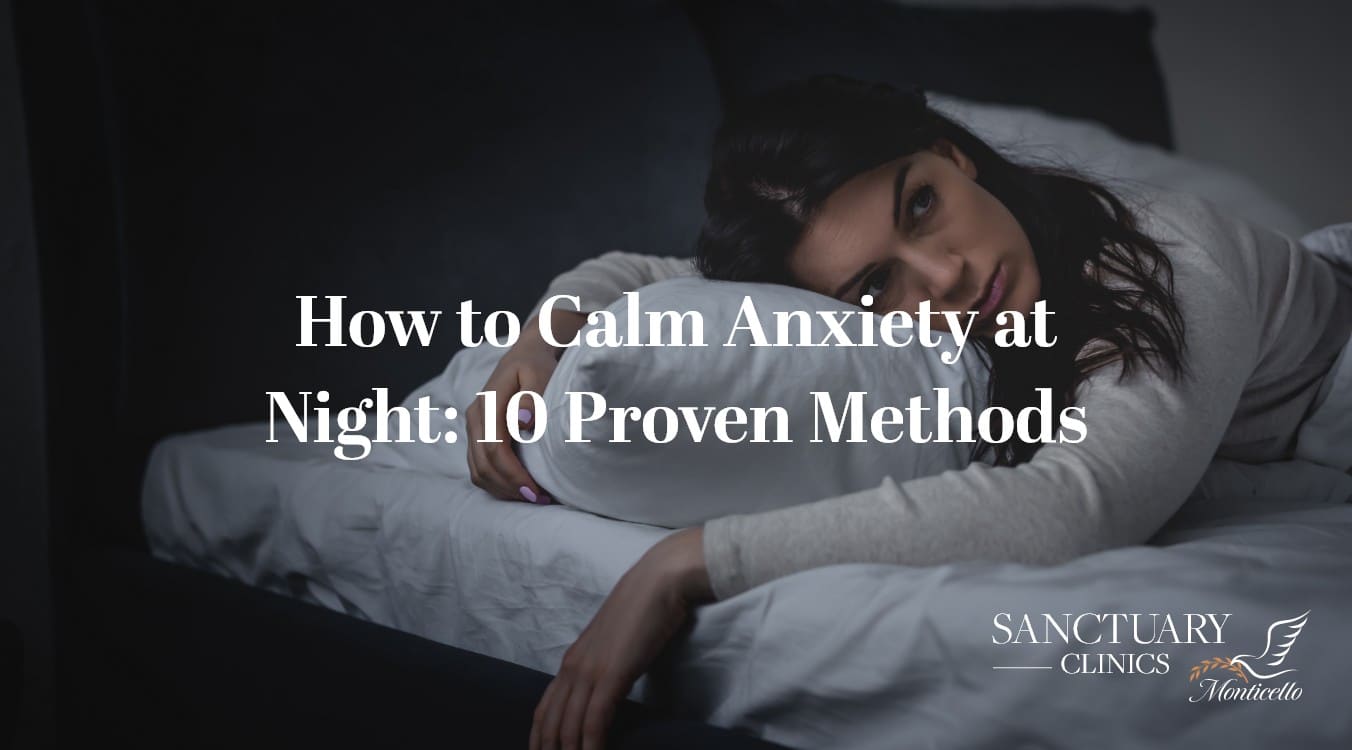How do you calm this anxiety at night? There are several techniques you can employ, including controlled breathing, progressive muscle relaxation, sleep routines, meditation, and avoiding stress before bedtime. In this post, we will consider 10 Proven Methods for calming nighttime anxiety.
What causes sleep anxiety?
While there’s not one specific thing that causes sleep anxiety, a number of things can contribute. Concentrating on your worries over work, family and friends, or anticipating the stresses of the next day as you prepare to sleep, fear, sadness, and accelerated thought patterns, all have the potential to trigger sleep anxiety.
The symptoms of nighttime anxiety
Symptoms of nighttime anxiety differ person to person, but generally they include difficulty falling and staying asleep, gastrointestinal issues, issues with concentration, nightmares and terrors, feeling restless and nervous, and hypnic jerk or twitching muscles.
Get Help Today.
We are here to help you through every aspect of recovery.
Let us call you to learn more about our treatment options.
We are here to help you through every aspect of recovery. Let us call you to learn more about our treatment options.
The effects of sleep anxiety
The importance of a good night’s sleep can hardly be overstated. Sleep anxiety can affect many areas of your life; having an adverse impact on your mood, boosting the likelihood of depressive symptoms, adversely affecting your school or work performance, reducing cognitive function, and muddling your attention span. Studies suggest people suffering from sleep anxiety are more prone to develop depression. Sleep anxiety can also put you at risk for physical problems such as diabetes, obesity, stroke, high blood pressure, and heart disease.
What can I do during the day to curb my anxiety level at night?
There are many things you can do on your own to curb your anxiety level before settling down to sleep. Exercising (but not immediately before bedtime), healthy living, and avoiding caffeine, alcohol and drugs can help. Recognizing your sources of stress and working to manage your stress levels and negative thoughts can also help. Here are some proven methods to implement:
10 Proven Methods for Calming Nighttime Anxiety
1. Breathing techniques
The grounding technique: Stop and breathe! Pay close attention to your breathing—inhale and exhale—and allow everything to slow down. Stand up, put your shoulders back, place your feet shoulder-width apart, and open your chest. This stance combined with the deep breathing—inhale and exhale—will give you a sense of grounding and feeling relaxed.
The 4-7-8 relaxing breath technique: Exhale completely making a windy sound through your mouth, breathe in deeply through your nose for four seconds, hold your breath for seven seconds, and then exhale again, making a windy sound for eight seconds. This technique can help relieve restlessness.
Gentle breathing: Find a peaceful place and sit or lie down restfully. Close your eyes. Breathe in and out slowly for around five minutes. Inhale all the way down to your belly. Exhale fully Center your attention on your breathing. This can help slow your mind’s running through todays or tomorrow’s worries.
2. Progressive relaxation
Find a peaceful place to sit or lie down restfully. This time, take some mellow breaths in and out. Start stiffening different muscle groups each time you breathe. Hold the muscle group tight on the inhale and release them on the exhale. Notice how the release feels. Start with your facial and neck muscles, then your shoulders, arms and hands, then on to your back, abdomen, buttocks, legs and feet—essentially working head-to-toe. Then repeat any areas that still feel tense.
3. Plan time to wind down.
Winding down gets you in the mood for sleep. You can take a bath, listen to peaceful music, and turn the lights lower. Spend some time reading something that isn’t on a screen as anything that emits blue light can keep your brain awake. Avoid computers, cell phones, and tablets for one to two hours before bedtime. The blue light alerts your brain to turn back on. Give your phone a bedtime that is before your bedtime. Perhaps use an app that tells relaxing sleep stories or provides calming music or sounds. You might eat some cherries or drink some tart cherry juice for the melatonin they contain. Try chamomile tea or eat a couple of brazil nuts.
4. Get a comfortable bed and consider purchasing a weighted blanket.
There’s nothing that curbs sleep more than an uncomfortable bed. Get a bed that is supportive to your body, is the right firmness for you, and is cooling. Weighted blankets can weigh between five and 30 pounds. The weight in a blanket boosts serotonin and melatonin and reduces cortisol, all contributing to relaxation and calmness. If you are handy, you might make your own weighted blanket by sewing additional weight into a comfortable blanket you already have.
5. Create a good sleep routine.
Always go to bed at the same time and follow the same routine. If you take naps, limit them to 20 minutes. Don’t eat heavy meals or exercise close to close to bedtime. Make sure your bedroom is dark and cool. Avoid caffeine and alcohol too close to bedtime. Eat your meals at the same time each day can also help.
6. Meditate
Meditation has been proven to calm anxiety, quieting your mind of stress. Many have found doing yoga poses in combination with meditation techniques helpful in getting ready for sleep.
7. Avoid stress before bedtime.
There must be a changeover time from daytime to sleeping time. Our brains need time of clear transition in order to get a good night’s sleep. Set a time to leave your worries behind from work, family, friends, and any other stressful situations—those concerns have their time, but it’s not when you are preparing for sleep.
8. Write your worries down.
Instead of letting worry keep you awake, you might write down anything you are worried about. This helps allow your brain to relax, set the concerns aside to be focused on the next day. Journaling can also help you fall asleep more rapidly. Grab your journal and a pencil, get cozy in bed and write down your thoughts. Then say goodnight to them until morning.
9. Keep from lying in bed awake.
If you have been lying in bed for more than 20 minutes and you’re still wide awake, don’t fight it. Get up and go do one of the activities mentioned outside of your bedroom. Read a book or drink some warm milk. These things help reprogram your brain and get you ready to fall asleep.
10. Make sure your surroundings are sleep friendly.
Your bedroom should be cool (between 60 and 67 degrees), darkened, and silent. You might also experiment with white noise or pink noise. We mentioned apps that allow you to play soothing sounds or gentle music—they usually have sleep-timer capability. Use them to enhance your comfort and relaxation.
What if none of these techniques work?
Make an appointment with your doctor or therapist. Either can help you figure out if you have a medical issue or a type of anxiety disorder which is contributing to your sleep difficulties. Here’s the bottom line: Left unchecked, nighttime anxiety can adversely impact all areas of your life. Don’t let anxiety at night have the last word. Get a good night’s sleep … and have a healthier and happier tomorrow.
Get Help Today.
We are here to help you through every aspect of recovery.
Let us call you to learn more about our treatment options.
We are here to help you through every aspect of recovery. Let us call you to learn more about our treatment options.









